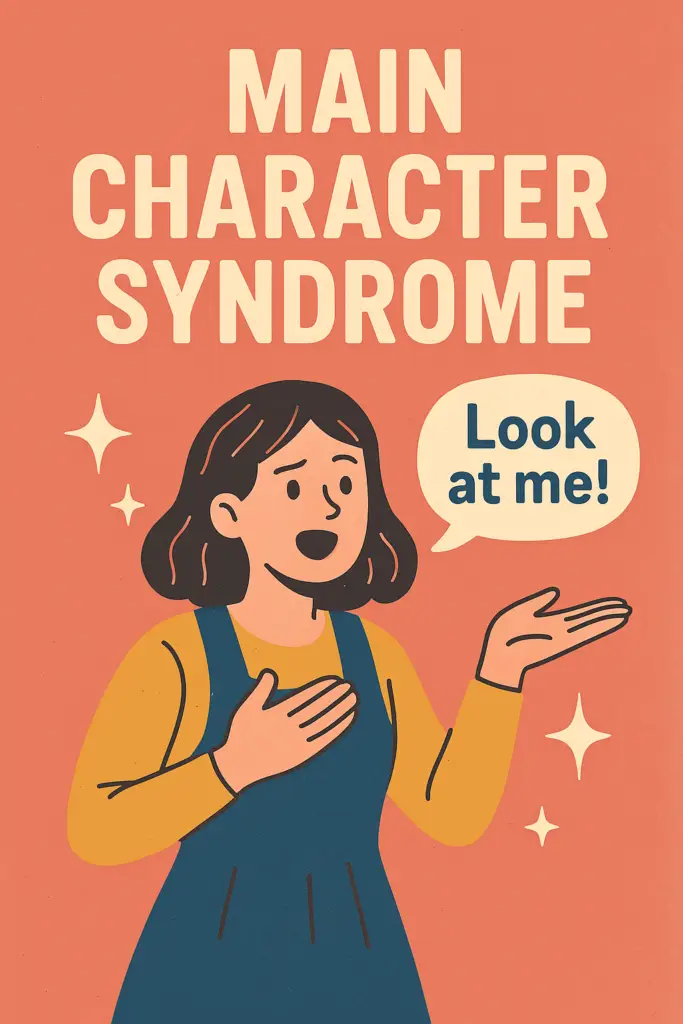When One Person Thinks They’re the Show — and You’re Just a Recurring Character
We’ve all seen it.
The person who walks into the room like a director just yelled “action!”, dramatically flops onto the couch, and launches into a monologue about their bad day—without asking a single question about yours.
At first, it’s funny. Endearing, even. They’ve got energy, stories, flair. You chalk it up to personality.
But over time, you start to feel like a supporting cast member in someone else’s emotional Netflix series.
And that’s where the charm fades, and Main Character Syndrome begins.
Let’s dive into what it is, how it kills empathy in relationships, and what to do when someone you love (or you!) is acting like the world is just their backdrop—and you’re just holding the boom mic.
What Is Main Character Syndrome?
Main Character Syndrome is when someone sees themselves as the center of every story—not just theirs, but everyone’s.
It’s not just confidence. It’s narrative narcissism:
- Every moment is about their feelings.
- Every conversation turns into their monologue.
- Every inconvenience becomes a plot twist in their drama.
And everyone around them?
Reduced to sidekicks, extras, or villains.
How It Shows Up in Real Life
Main Character Syndrome isn’t always loud or obvious. Sometimes it shows up in subtle, emotionally draining ways:
🎭 1. One-Upping Every Story
You: “I had such a hard day at work.”
Them: “That’s nothing—my day was way worse.”
🧃 2. Sucking the Oxygen Out of Every Room
They enter and every topic, every vibe, every emotion shifts to accommodate them.
❓ 3. Never Asking Questions Back
You ask them how they are. They answer. At length. And then… crickets.
🧠 4. Making Your Feelings About Them
You: “I’m really anxious about this thing coming up.”
Them: “Ugh, don’t dump that on me. I’m already stressed!”
🕯️ 5. Performing Vulnerability Instead of Practicing It
They share “deep stuff” but only in curated, dramatic ways—without reciprocating when you open up.
Why Main Character Syndrome Is Spiking Right Now
Let’s not pretend we live in a vacuum. Social and cultural forces are feeding this syndrome like it’s trying to bulk up for a Marvel role.
📱 Social Media = Constant Self-Narration
We’re encouraged to brand ourselves, post highlights, and curate a storyline. “I’m the main character” has become a trend… but sometimes the irony is lost.
🧍♀️ Individualism Over Empathy
In a culture that prizes self-care, personal growth, and hustle culture, empathy gets edged out. Everything becomes “How does this affect me?”
😵💫 Trauma As Identity
Yes, trauma needs to be acknowledged. But sometimes, it becomes a script that people use to justify bad behavior or avoid accountability.
The Relationship Toll: When You’re Not the Star of Your Own Life
When you’re close to someone with Main Character Syndrome, you may start to feel:
- Emotionally invisible
- Drained after conversations
- Unseen in your own struggles
- Pressured to validate them constantly
- Afraid to share your truth because it’ll be hijacked or dismissed
And here’s the kicker: they’re not always doing it maliciously. Many people with Main Character Syndrome are:
- Deeply insecure
- Unaware of their impact
- Stuck in a survival mode where everything feels like a battle for attention
But even if the intention isn’t toxic—the effect can be.
Therapist’s Tips: Reclaiming Empathy in Main Character Relationships
Whether you’re dating, married to, friends with, or related to someone with MCS, here’s how to stop playing a supporting role in their one-person show:
🧭 1. Use “Scene Stealer” Moments to Redirect
Tip: If they hijack the convo, gently say:
“Let’s circle back to what I was saying—I still need to process it.”
You don’t need to compete for attention. You just need to reclaim the scene.
🗣️ 2. Call Out the Monologue, Not the Person
Tip: “I’ve noticed our convos tend to center around your experience. Can we share the mic a bit?”
Framing it as a shared pattern—not a personal flaw—lowers defensiveness.
💡 3. Ask for Curiosity
Tip: “I’d love it if you asked me more questions or checked in after I share something.”
You’re not asking them to change overnight. You’re inviting them into reciprocity.
🧘♀️ 4. Use the “Spotlight Rule”
If someone has been talking about themselves for more than 5–7 uninterrupted minutes (yes, really), it’s time to shift.
Try: “Thanks for sharing that. Can I tell you something that’s been on my mind too?”
It’s not rude. It’s rebalancing the dynamic.
✨ 5. Don’t Shrink—Shine
People with MCS tend to take up space—but that doesn’t mean you have to give up yours.
- Keep sharing your stories.
- Keep honoring your emotions.
- Keep owning your narrative.
You’re not “too much” for wanting to be seen. You’re just tired of being edited out of your own story.
What If You’re the Main Character? (It’s Okay—We’ve All Been There)
Before you guilt spiral, take a breath.
We all have moments where we’re the star of the show. When we’re in pain, overwhelmed, or just feeling under-loved, it’s natural to pull focus.
But here’s how to know if it’s become a pattern:
- Do you interrupt often?
- Do you ask others how they’re doing… and actually listen?
- Do you validate or redirect?
- Do you make room for other perspectives?
If you’re unsure, ask a close friend or partner. It takes real courage to ask, “Do you feel like I leave space for your story, too?”
And if you’ve been stuck in your own script lately, that’s okay. The fix isn’t shame—it’s empathy. The world doesn’t need fewer main characters. It just needs better ensemble casts.
Final Thoughts: Be the Main Character—But Not the Only One
There’s nothing wrong with wanting to feel seen, heard, or special. We all deserve that. But when one person hogs the narrative spotlight, empathy dies—and with it, connection.
Healthy relationships are co-written scripts, not one-person plays. They ebb and flow. Share and receive. Speak and listen.
So by all means, be the main character—live your boldest, loudest, fiercest truth.
But when someone you love steps on stage too?
Hand them the mic. Step back into the ensemble.
Because the best stories aren’t solo acts.
They’re the ones we build together.
Here’s a “Main Character Syndrome Check-In Worksheet” — perfect for self-reflection or to use with a partner, friend, or therapist. It’s light, honest, and designed to help people reflect without guilt-tripping themselves. Here’s a downloadable PDF version.
📝 Main Character Syndrome Check-In Worksheet
“Am I Sharing the Stage — or Stealing the Show?”
🎭 Section 1: Self-Awareness Audit
1. In conversations, I usually talk about:
- Mostly myself
- A mix of me and them
- Mostly them
2. When someone shares a problem with me, I tend to:
- Relate it back to a similar experience I had
- Ask follow-up questions
- Offer emotional support or validation
3. Do I regularly ask people how they’re feeling (and really listen)?
- Rarely
- Sometimes
- Often
4. Do I ever feel disappointed or irritated when the conversation isn’t about me?
- All the time
- Occasionally
- Not really
💬 Section 2: Your Inner Narrator
Complete the following prompts honestly:
- My default story about myself is…
“I am the kind of person who…” - In group settings, I usually feel…
“I need to ___ in order to be seen/heard.” - When someone else is the center of attention, I tend to…
🧠 Section 3: What You Might Be Missing
True or False:
- I regularly pause to check in on how others are doing emotionally.
- I can listen without immediately offering my own opinion or story.
- I create space for others to express themselves, even if it’s not exciting to me.
- I show curiosity about others’ lives, experiences, and perspectives.
If you answered mostly “False,” that’s okay—but it’s a cue to refocus on connection, not performance.
👫 Section 4: Reflection With a Partner or Friend (Optional)
Ask your partner/friend:
- “Do you ever feel like I talk over you or shift the focus back to me too quickly?”
- “Is there anything I could do better to make you feel more seen or heard?”
- “When we talk, do you feel like it’s mutual—or one-sided?”
Be open. Take notes. Thank them for their honesty.
❤️ Section 5: Reset Your Role
New commitments for the week:
- One person I want to ask deeper questions to: __________
- One time this week I’ll choose to listen more intentionally: __________
- One way I’ll practice being part of the ensemble instead of the lead: __________
Remind yourself:
I can be a main character and make room for others to shine. This isn’t about shrinking—it’s about sharing the spotlight.

